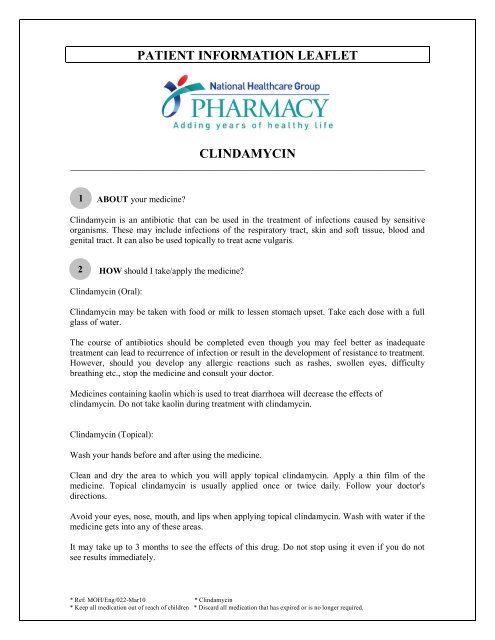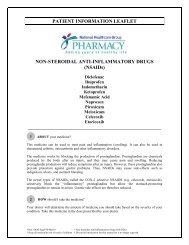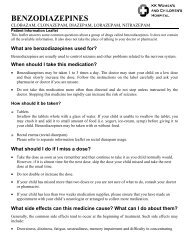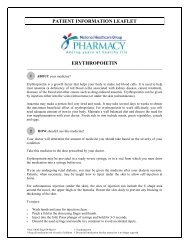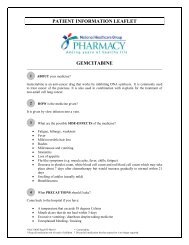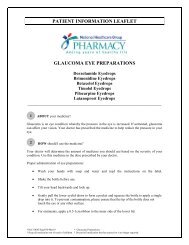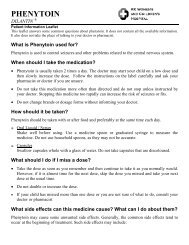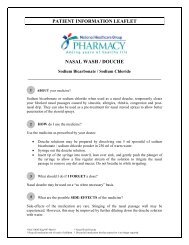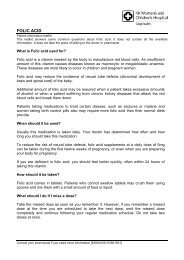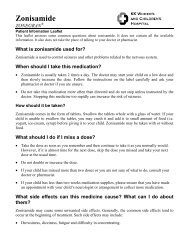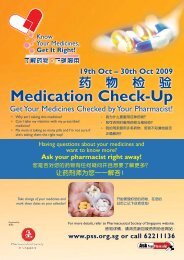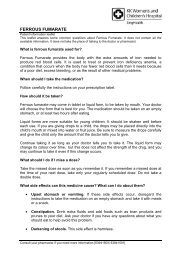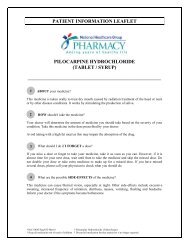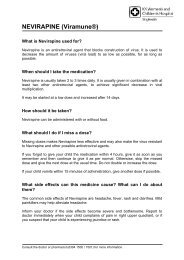Clindamycin
Clindamycin
Clindamycin
You also want an ePaper? Increase the reach of your titles
YUMPU automatically turns print PDFs into web optimized ePapers that Google loves.
PATIENT INFORMATION LEAFLET<br />
CLINDAMYCIN<br />
_________________________________________________________________________<br />
1<br />
ABOUT your medicine?<br />
<strong>Clindamycin</strong> is an antibiotic that can be used in the treatment of infections caused by sensitive<br />
organisms. These may include infections of the respiratory tract, skin and soft tissue, blood and<br />
genital tract. It can also be used topically to treat acne vulgaris.<br />
2<br />
HOW should I take/apply the medicine?<br />
<strong>Clindamycin</strong> (Oral):<br />
<strong>Clindamycin</strong> may be taken with food or milk to lessen stomach upset. Take each dose with a full<br />
glass of water.<br />
The course of antibiotics should be completed even though you may feel better as inadequate<br />
treatment can lead to recurrence of infection or result in the development of resistance to treatment.<br />
However, should you develop any allergic reactions such as rashes, swollen eyes, difficulty<br />
breathing etc., stop the medicine and consult your doctor.<br />
Medicines containing kaolin which is used to treat diarrhoea will decrease the effects of<br />
clindamycin. Do not take kaolin during treatment with clindamycin.<br />
<strong>Clindamycin</strong> (Topical):<br />
Wash your hands before and after using the medicine.<br />
Clean and dry the area to which you will apply topical clindamycin. Apply a thin film of the<br />
medicine. Topical clindamycin is usually applied once or twice daily. Follow your doctor's<br />
directions.<br />
Avoid your eyes, nose, mouth, and lips when applying topical clindamycin. Wash with water if the<br />
medicine gets into any of these areas.<br />
It may take up to 3 months to see the effects of this drug. Do not stop using it even if you do not<br />
see results immediately.<br />
* Ref: MOH/Eng/022-Mar10 * <strong>Clindamycin</strong><br />
* Keep all medication out of reach of children * Discard all medication that has expired or is no longer required.
3<br />
What should I do if I FORGET a dose?<br />
<strong>Clindamycin</strong> (Oral):<br />
Take the missed dose as soon as you remember. If it is almost time for your next usual dose, wait<br />
until then to take your medicine and skip the missed dose. Do not take two doses at the same time.<br />
<strong>Clindamycin</strong> (Topical):<br />
Apply the missed dose as soon as you remember. However, if it is almost time for your next dose,<br />
skip the dose you missed and apply only your next scheduled dose. Keep applications at least 12<br />
hours apart.<br />
4<br />
What are the possible SIDE-EFFECTS of the medicine?<br />
If you experience any of the following serious side-effects, stop taking/applying clindamycin and<br />
seek emergency medical attention:<br />
<br />
an allergic reaction (swelling of your lips, tongue, or face; shortness of breath; closing of<br />
your throat; or hives); a rash; severe diarrhoea or abdominal pain; yellow skin or eyes; little<br />
or no urine.<br />
Other less serious side-effects may be more likely to occur. Continue to take/apply clindamycin<br />
and talk to your doctor if you experience nausea, vomiting, decreased appetite, heartburn, or an<br />
unpleasant or metallic taste in your mouth.<br />
Side-effects other than those listed here may also occur. Talk to your doctor about any side-effect<br />
that seems unusual or that is especially bothersome.<br />
5<br />
What PRECAUTIONS should I take?<br />
<strong>Clindamycin</strong> (Oral):<br />
You may not be able to take clindamycin or you may require a lower dose or special monitoring<br />
during your therapy if you have any of the conditions:<br />
<br />
liver disease, kidney disease, stomach or intestinal disease.<br />
It is not known whether clindamycin will harm an unborn baby. Do not take this medication<br />
without first talking to your doctor if you are pregnant.<br />
<strong>Clindamycin</strong> passes into breast milk and may affect a nursing infant. Do not take this medication<br />
without first talking to your doctor if you are breast-feeding.<br />
* Ref: MOH/Eng/022-Mar10 * <strong>Clindamycin</strong><br />
* Keep all medication out of reach of children * Discard all medication that has expired or is no longer required.
<strong>Clindamycin</strong> (Topical):<br />
Avoid applying topical clindamycin to broken or irritated skin. This medication could make your<br />
condition worse.<br />
Avoid using other topical products on the same area at the same time unless directed to do so by<br />
your doctor.<br />
Avoid using harsh, abrasive, or irritating cleansers, perfumes or cosmetics during therapy with<br />
topical clindamycin.<br />
Topical clindamycin is unlikely to harm an unborn baby. However, do consult the doctor if you are<br />
pregnant before using topical clindamycin.<br />
Topical clindamycin passes into breast milk and may affect a nursing infant. Do not use topical<br />
clindamycin without first talking to your doctor if you are breast-feeding.<br />
6<br />
How should I STORE the medicine?<br />
Store the medicine in a cool, dry place. Protect from moisture, heat and direct light.<br />
* Ref: MOH/Eng/022-Mar10 * <strong>Clindamycin</strong><br />
* Keep all medication out of reach of children * Discard all medication that has expired or is no longer required.


